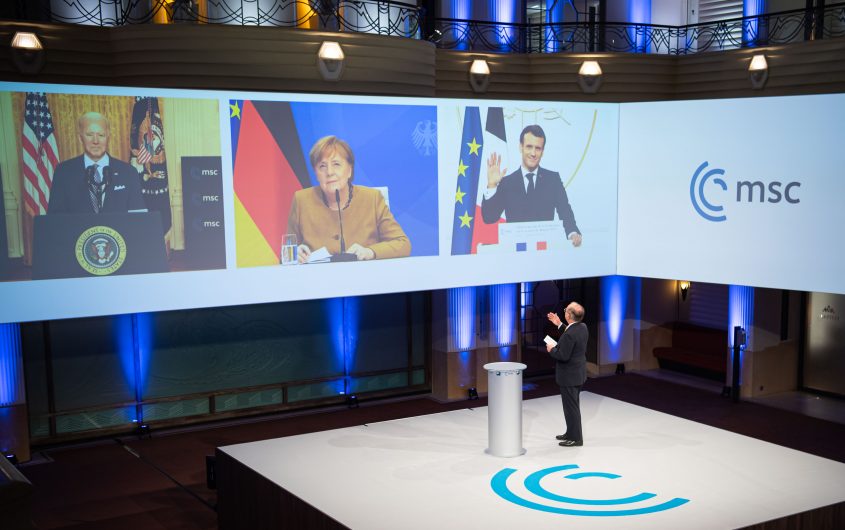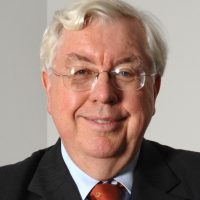
AGI Asks: What is Angela Merkel’s Transatlantic Legacy?
Daniel Hamilton
Johns Hopkins SAIS
Daniel S. Hamilton is the Austrian Marshall Plan Foundation Distinguished Fellow and Director of the Global Europe Program at the Wilson Center. He is a widely-recognized expert on U.S. foreign policy and on European, Eurasian and transatlantic security, economic and political affairs. He is quoted frequently in major U.S., European and global media and has testified on numerous occasions before committees of the U.S. Congress and European parliaments.
He is also Senior Fellow at the Foreign Policy Institute of Johns Hopkins SAIS, where he co-leads the School’s postdoctoral program on “The United States, Europe, and World Order.” He was the Founding Director of the SAIS Center for Transatlantic Relations, and for fifteen years served concurrently as Executive Director of the American Consortium for European Union Studies. He has also taught at the Free University of Berlin, the University of Innsbruck, and the Hertie School of Governance.

Jeffrey J. Anderson
Georgetown University
Dr. Jeffrey J. Anderson is Graf Goltz Professor and Director of the BMW Center for German and European Studies at the Edmund A. Walsh School of Foreign Service, Georgetown University. He is an expert in European politics, with special emphasis on the European Union and postwar German politics and foreign policy, and author of German Unification and the Union of Europe.
Dr. Jeffrey J. Anderson is Graf Goltz Professor and Director of the BMW Center for German and European Studies at the Edmund A. Walsh School of Foreign Service, Georgetown University. He is an expert in European politics, with special emphasis on the European Union and postwar German politics and foreign policy, and author of . He is the recipient of the 2000 DAAD Prize for Distinguished Scholarship in German Studies, and in 2016 he was awarded the Officer's Cross of the Order of Merit of the Federal Republic of Germany in recognition of his outstanding contributions to German-American and transatlantic exchange in academe and education.

John Kornblum
AGI Trustee
John Kornblum is a senior counselor at the international law firm Noerr LLP and a former U.S. ambassador to Germany. He is a member of the AGI Board of Trustees.

Kristina Spohr
Johns Hopkins School for Advanced International Studies
Kristina Spohr was the Helmut Schmidt Distinguished Professor at Johns Hopkins’ School of Advanced International Studies, at the Henry Kissinger Center for Global Affairs (2018-2020), and is now a Senior Fellow at the Henry A. Kissinger Center for Global Affairs at SAIS-Johns Hopkins (2020-21). She is a specialist in the International History of Germany since 1945 and interested in the theory and practice of Contemporary History. She is now researching and writing on the global exit from the Cold War 1989-1992 - with the financial support of The Leverhulme Trust.
She is author of The Global Chancellor: Helmut Schmidt and the Reshaping of the International Order (Oxford University Press, 2016) and its extended German edition Helmut Schmidt: Der Weltkanzler (Theiss, 2016) as well as lead-author of a co-edited volume Transcending the Cold War: Summits, Statecraft, and the Dissolution of Bipolarity in Europe, 1970-1990 (Oxford University Press, 2016).
Her previous books include Germany and the Baltic problem after the Cold War: The Development of a New Ostpolitik, 1989-2000 (London: Routledge, 2004; paperback 2013); Building Sustainable and Effective Capabilities: A Systemic Comparison of Professional and Conscript Forces (IOS Press, 2004 - as editor and contributor); Journal of Contemporary History Special Issue: At the Crossroads of Past and Present — ‘Contemporary’ History and the Historical Discipline (London: Sage – vol. 46, 3 (2011 - as co-editor and contributor).

Nicole Renvert
Dr. Nicole Renvert is a political scientist with a special focus on the analysis of think tanks, foundations, and Non-Governmental Institutions. Her recent book “Power Brokers in Difficult Times” reviews the role of German Political Foundations in transatlantic relations. Dr. Renvert has studied History, International Relations, and Political Science at the Universities of Bonn, the Sorbonne, and Georgetown University. She has worked for the United States Holocaust Memorial Research Institute (USHMM), the World Bank, and the OSCE. She was the Director of the Transatlantic Project of the Bertelsmann Foundation and held assignments with the Herbert-Quandt-Foundation, Altana AG, the Robert Bosch Stiftung, and the Aspen Institute Berlin. Dr. Renvert was a Visiting Fellow at the Policy Planning Division of the German Foreign Office, at the American Institute for Contemporary German Studies (AICGS) in Washington, DC, and at the Institute for Foreign Relations (ifa) in Stuttgart. From 2008- 2014 she was a Researcher at SWP, the German Institute for International and Security Affairs. In 2014 she became a Fellow at the Käte Hamburger Kolleg, Centre for Global Cooperation, University Duisburg Essen and did research on “The Impossibility to Cooperate.” Nicole is now a Member of the Executive Board of the Asia-Pacific Committee of German Business (APA) in Berlin. Her current projects are on the notion of trust in International Relations.

Peter Rough
Hudson Institute
Peter Rough has been a fellow at Hudson Institute in Washington, DC, since 2014. He writes and comments on U.S. foreign policy toward Europe and the Middle East and edited Hudson’s journal, Current Trends in Islamist Ideology. Prior to joining Hudson, Peter collaborated on a social history of World War I in the Middle East, A Land of Aching Hearts, published by Harvard University Press in fall 2014. A former associate director in the White House Office of Strategic Initiatives, he also served as director of research in the Office of George W. Bush, assisting the former president with his memoir, Decision Points.
Peter has completed stints as a policy analyst at the U.S. Agency for International Development and as an advisor to U.S. Army Special Operations Command. He also helped direct foreign policy working groups for the Romney and Rubio presidential campaigns, focusing on Russia and the Middle East, respectively. A proud native of Des Moines, Iowa, he is a graduate of the George Washington University and the Fletcher School of Law and Diplomacy, where he was a Cabot Corporation Scholar. He is a native German speaker.
He was a 2017-2018 participant in AICGS’ project “A German-American Dialogue of the Next Generation: Global Responsibility, Joint Engagement,” sponsored by the Transatlantik-Programm der Bundesrepublik Deutschland aus Mitteln des European Recovery Program (ERP) des Bundesministeriums für Wirtschaft und Energie (BMWi).
AGI asks:
What is Chancellor Angela Merkel’s transatlantic legacy? How has the partnership fared under Merkel, and what challenges are left for her successor?
John Kornblum
AGI Trustee
As she nears the end of her tenure, many foreigners in particular criticize Angela Merkel for the purported lack of vision and even stagnation during her sixteen years in office. Vision was indeed lacking, but there was in fact lots of change. Watching what Germany does rather than what it says remains critical to understanding what is going on there.
Merkel’s first campaign in 2005 stressed reform and change. She barely eked out a victory against an increasingly unpopular opponent. Almost immediately, she changed her tone. Four years later, she even ran on Konrad Adenauer’s old slogan “No Experiments (please).”
Fact is, Merkel experimented a lot. She allowed the ECB to pump money into the economy to save the Euro. She pushed through a radically new energy policy. She allowed a million or more refugees into the country. She ended military conscription. She became Europe’s point person for relations with Russia and China. But each of these steps shared a common attribute – they were sold as improvements to the status quo rather than as visionary change.
While the rest of the world was seeking a totally new German narrative, Merkel stressed that things would stay as they were. She came to understand that in a nation traumatized by violent upheavals, voters demanded an emotional insurance policy before accepting change.
Maybe one of the reasons that Germany has moved rapidly to the front ranks of world nations, is that German politicians have become adept at making new ideas sound like old ones. In the words of Konrad Adenauer: “No experiments.”
Jeffrey Anderson
Georgetown University
“Things fall apart, the center cannot hold…” This famous line from William Butler Yeat’s poem “The Second Coming” could easily have provided the epitaph for the transatlantic relationship had Donald Trump won re-election in 2020. That it did not owes everything to the 81 million voters who chose Joe Biden over the incumbent president. That the transatlantic relationship remained salvageable for a Biden presidency in January 2021, after four years of savaging by the Trump White House, owes everything to German Chancellor Angela Merkel. As the United States’ key ally in Europe – a role expressly rejected by the Trump Administration as it shifted strategic attention to like-minded governments in Poland and Hungary – the Federal Republic of Germany held the fate of the US-European relationship in its hands between 2016-2020. Had Chancellor Merkel responded in kind to Trump’s taunts, slights, fabrications, and unilateral actions, one could easily imagine a relationship in ruins by November 2020, rendering largely irrelevant the question of which US presidential candidate would prevail. Instead, the Chancellor kept the relationship with the United States on an even keel during those four long years with an artful blend of de-escalation, resolve, and autonomy. For this diplomatic tour de force, we Americans should be eternally grateful.
Dan Hamilton
Woodrow Wilson International Center for Scholars
Angela Merkel’s departure will be profound for Germany and for Europe. She has steered the shoals of many crises. She is leaving behind a Germany that has become more open yet less settled, more diverse demographically and politically, more pressured economically, and less circumspect internationally than when she arrived. She worked with Putin but evaded his embrace. She engaged her French counterparts but avoided their shadow. She neatly sidestepped the Trump tempest. Under her tenure, Germans have remained committed to multilateral solutions to international problems, but they have become less inhibited about defining terms of engagement more conducive to German interests. They are still committed to European integration, but they have come to realize that the slogan “more Europe” isn’t always an answer to German questions. They have come to expect less from America even as Americans have come to expect more from Germany.
Under Merkel, Germany has once again become Europe’s center, the key swing state on a continent in tremendous flux. It is a country with great weight yet uncertain power. It is selectively strong. Yet it retains significant vulnerabilities and is often beset by self-doubt. As Germany rose, Merkel understood the hesitations of her neighbors and the uncertainties of her compatriots. Merkel’s cool, cautious and incremental style was so distinctive it became a verb. When she was at her best, merkeln came to mean an ability to manage united Germany’s evolution in a way that reassured other countries about Germany and reassured the Germans about themselves. That is perhaps her greatest legacy.
Nicole Renvert
Over fifteen years, Germany has prospered under Chancellor Merkel. Even in times of crisis, Merkel, with her steadfast policy, gained domestic and worldwide respect. Her focus was always on economic policy for Germany, not on foreign and security policy. This is perhaps the greatest missed opportunity of her term in office, because of its consequences for the relationship with the United States. When she took office in 2005, the transatlantic relationship had just reached an all-time low under Chancellor Schroeder over the U.S. intervention in Iraq. However, transatlantic irritations went far beyond that. Different ideas about the fight against terrorism, climate change, the role of multilateral institutions, and contributions to NATO were just some of the difficult subjects. From there, Chancellor Merkel could have re-built the transatlantic relationship from scratch: emphasizing how much Germany gains from U.S. protection in the fight against terrorism, providing substantial support for security issues, and showing how reliable Germany is as a foreign and security ally. Merkel promised President Obama to send police units to Afghanistan but could not deliver because the states, not the federal government, decide on the posting. Merkel made herself vulnerable to criticism in the United States with such unfulfilled promises. Many of these issues will weigh on the transatlantic agenda after Angela Merkel’s term but under more difficult conditions: The costs of the COVID-19 pandemic will limit the possibilities of providing funds for security while at the same time the geopolitical climate is becoming harsher: from China’s rise as a geopolitical power and increasing aggression from Russia to the tense situation in the Near and Middle East.
A strong transatlantic partnership is essential to tackle these worldwide issues. It should be the number one priority on Germany’s agenda in a post-Merkel era.
Peter Rough
Hudson Institute
Angela Merkel assumed the chancellorship in Berlin the same year that U.S. politics entered a period of high volatility. Since 2005, the year that Hurricane Katrina swept ashore the United States and Merkel took office, U.S. voters have replaced the party that controlled both houses of Congress and the White House three times. While Americans lurched from one politics to the next, Merkel enjoyed a remarkable staying power atop German politics. In effect, while U.S. voters signaled dissatisfaction, German voters proved content.
It’s easy to see why. Merkel inherited a country ready for takeoff and presided over an era of great prosperity. No country in Europe, and perhaps the world, has benefited as much from the post-Cold War order as Germany. Under Merkel’s leadership, Germany grew into the biggest power on the continent, surpassing its longstanding partner, France, and the United Kingdom. Today, it dominates the European economy while sheltering under the U.S. security umbrella. Merkel will go down as the last chancellor of this post-Cold War era.
For Americans, Merkel’s personal qualities are synonymous with those of Germany: competent, skilled, exacting, deliberate, understated. She has been a constant in an era of change, and that is no small thing. During the Greek debt crisis and the pandemic-induced economic paralysis, Merkel proved instrumental in holding Europe together. But her tenure has had blemishes, too. Her leadership during the immigration crisis of 2015 contributed to Brexit and destabilized her own country.
In her last term in office, Merkel sought to rescue globalization from geopolitics. She has forestalled coordination of the transatlantic political economy after long promoting China as the export market of the future. Alas, a new era of competition with China, and, to a lesser extent, Russia appears unavoidable. China now sees Germany as a plum ripe for the picking. Merkel has made it more, not less, difficult to tackle this problem, but that challenge, and the volatility it will produce, will be for her successor to solve.
Kristina Spohr
Johns Hopkins University School of Advanced International Studies
Quiet and understated, Angela Merkel is today the West’s longest-serving leader. No tweets, no gossip, no hissy fits or saucy photos. These have been the hallmarks of her tenure and the secret to her power. And, she will be the first German chancellor to leave the office of her own accord.
She has had her shortcomings: the vagueness of her program (domestic and European), the inner contradictions in her decision-making under public pressure (cf. the abolition of nuclear energy), the lack of sparkling oratory skills, and her technocratic prudence, even hesitancy. In terms of policy, increasingly Berlin has been dithering over standing up to Moscow and Beijing; and German military weakness and its unpreparedness to lead in an ever more digital world are undercutting Euro-Atlantic security. At home, in the pandemic, Merkel has failed to reign in the 16 Laender bosses who have each made their own health policies all the while competing for their parties’ chancellorship candidacies.
Angela Merkel thus leaves behind an ambivalent legacy and a political vacuum. There is, however, much to be learned from her. Four election victories are no easy feat. Nobody is polled the world’s most trusted leader without cause. Not everyone has liked her, but nobody could get around her. Chancellor Merkel has built bridges and brokered compromises. In the face of adversity, she has calmly ploughed on. She has wielded influence by relying on reason and cooperation. Above all else, she has embodied power without vanity.







